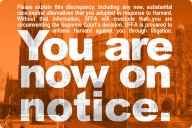You have /5 articles left.
Sign up for a free account or log in.
In a world where ignorance is bliss, 'tis foolish to be wise.
That saying's probably been around for a long time, but I first heard it decades ago, from the mouth of a drunk who said his name was Eddie Cornell (never found out if he was related to Ezra) at a bar near or in (I forget which) the Montreal train station. (Yup, the same one that's downstairs from the Queen Elizabeth Hotel, which is sold out for this year's SCUP conference.)
Somehow, the phrase jumped back into my mind as I was reading a news item about how the Louisiana legislature voted 94-3 in favor of the Louisiana Science Education Act, which supports "education" in science by means of religion-based speculation. The story said it would change how evolution, cloning, and global warming are taught. Supporters claimed that the purpose of the bill was not to promote any particular religious doctrine. On the other hand, I'm sure that any teacher who put forward only an alternative to evolution based on Celtic, Norse or Native American religion (as opposed to Jewish or Christian teachings) would find that some doctrines are more equal than others.
Then I happened upon Lawrence Krauss's column "It's a wonderful cosmos ..." (available to subscribers only, I'm afraid), riffing off David Brooks's NYT op-ed piece, "The Great Escape". Krauss concludes:
Why does it matter if people cling to myths for solace? Because real-world problems such as climate change can only be solved by real-world thinking. Like it or not, the harsh reality is that nature doesn't exist to serve humanity, and turning to myths that put humans at the centre of creation only distract [sic] us from appropriate actions.
Brooks's column ... mentioned Barack Obama's much maligned statement that some people turn to religion for refuge from the inequities that abound in Bush's America -- a truth many people would rather not hear. If we live at a time when honest questions about the role of religion and people's motivations for action cannot be voiced in public, then I worry about our future.
Personally, I'm befuddled. I doubt that there ever was "a time when honest questions about the role of religion and people's motivations for action" could be freely voiced in public, especially by leaders (aspiring or otherwise). I don't want anyone to attack, for instance, the motivations of adherents of the stewardship movement within many fundamentalist congregations, nor any of the faith-based social justice movements (effective and otherwise). I'm not sure how I feel about the statement that "real-world problems such as climate change can only be solved by real-world thinking". Planning is best done based on understanding. But, if actors work in concert, must their thinking all be consistent? Can't a common challenge (like a common enemy) serve a strong unifying function?
I've never claimed to be wise (only arrogant, as my wife periodically reminds me), but I don't aspire to increased ignorance, either. Dare I hope for bliss?





